As an Amazon Associate I earn from qualifying purchases.
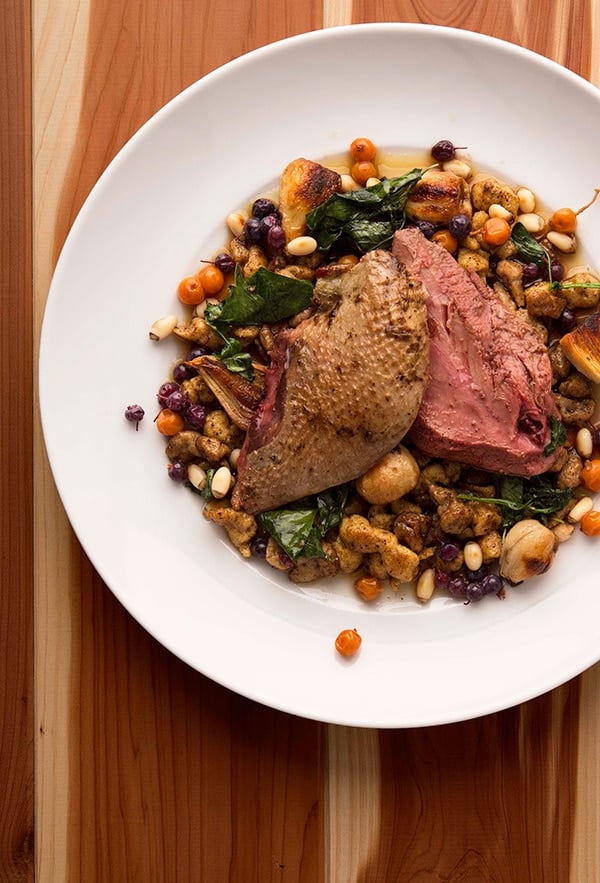
This recipe is a hunt on a plate.
It’s what I did with my lone band-tailed pigeon I shot earlier in the week. Bandtails are a special bird, and I wanted to treat this one with that in mind.
Let me state at the outset that I don’t suspect anyone will ever make this recipe. It’s basically unrepeatable. But, a) I don’t care, and b) the point isn’t my exact recipe, it’s to give you a way of thinking about creating a wild game meal that is especially satisfying.
Long-time readers of Hunter Angler Gardener Cook will know what I am doing: I am creating a dish from ingredients that the main course either eats or lives among. I wrote an essay about cooking with this sense of place some years ago, and it’s worth your time if you are so inclined.
Here I’ll get a bit more mechanical, as in, how do you prepare yourself for making your own version of a dish like this.
First, you’ll need to know what the animal in question eats. Birds are easy: Look in their crops when you clean them. Mammals are harder, but you can open stomachs. I don’t, however, as that’s nasty. Easier is to Google the words “food habits,” yes, in quotes, and the Latin name of the animal. This is a common area of study among biologists, and it will give you ideas about foods that they eat that we eat, too.
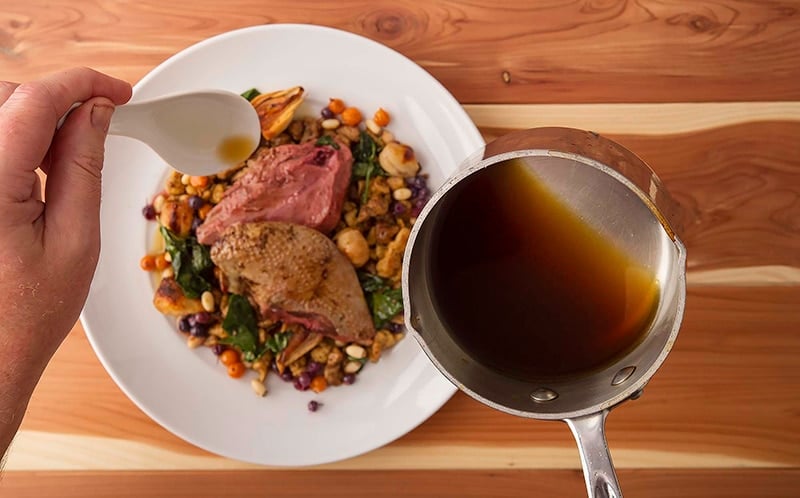
In the case of a band-tailed pigeon, it’ll be acorns, pine nuts, and various alpine berries. They eat other things, too, but I wanted to stick to the environment I was hunting in, i.e., the High Sierra. For that, I added camas bulbs (Here’s how to cook camas) and some pigweed I saw growing.
OK, so you have some sense of a list of ingredients you might possibly use. How to put them together?
A good dish is balanced, like a good shotgun. You want savory, usually supplied by the meat in question; band-tailed pigeon, in this case. You want a touch of sweet, as game likes fruit. You want salty, something tart and possibly something spicy. A starch is a good thing to have, although not 100 percent needed.
Texture is important, too. You don’t want everything on the plate to be soft, or crunchy, or chewy. You want elements of all those things, though. Here, the camas bulbs are starchy-chewy, the pine nuts crunchy, the spatzle soft.
The pickled alpine blueberries and rowan berries are tart, a little sweet, and, in the case of the rowans (also called mountain ash), they are a touch astringent, too.
How to put this all together? Well, you really need a pantry, and a serious one at that. This recipe is actually quite easy to do, but only if you happen to have the ingredients lying around. I pickle blueberries as well as mountain ash as a matter of course, so I have them.
I also make acorn flour every year, so I have that, too. Here is how to make the acorn spätzle.
And yes, I gather wild American pine nuts every fall. As for cooking the pigeon, you want to use the same method I use for pan-roasted partridges.
Do all this and the dish comes together in a flash. I can hear you laughing, though, because yeah, it’s a stretch to think that you have all these esoteric ingredients and pickles lying around. I get it.
Here’s the larger point: Understand the environments you hunt or fish in — yes, this method can be used with fish, too. Be aware of the potentially good things to eat in those environments, and, especially on slow days, gather and preserve them.
Develop that bad-ass pantry. Observe the edible things around you as you hunt. Create your own memorable trophy meals. Who cares if they are unrepeatable?
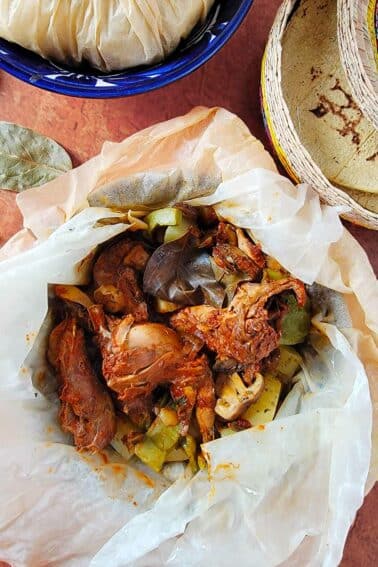
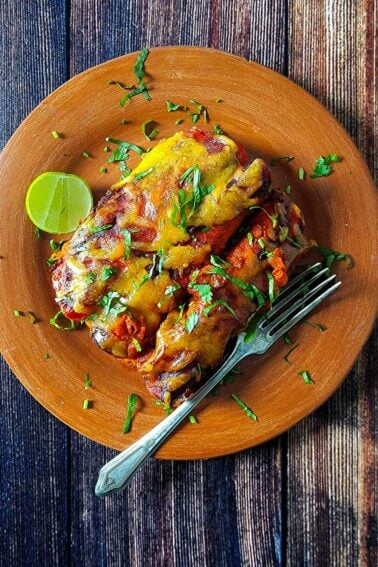
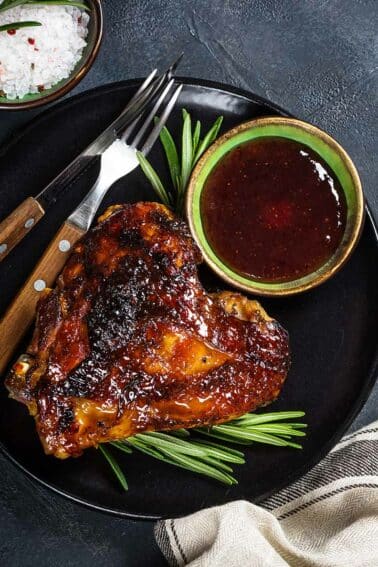
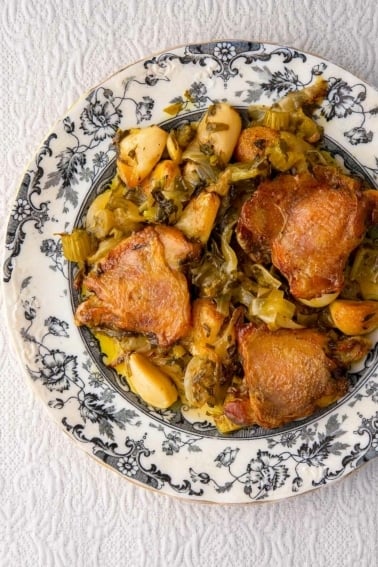
A truly amazing recipe. Hank, you are an inspiration, and I can see that I must continue to expand my wild game culinary horizons. So many recipes, so little time, but yours are some of the best. So much more hunting and fishing to do too. Thanks…
Take a dove breast half & cook it medium well- well done, (it will be tough & “livery”). Take another & cook it medium rare, (it will be tender & juicy). Taste both, then make your decision. The fear of medium rare bird comes from commercially processed chicken, which would be dangerous to eat that way soy to the fecal soup they are ended in at the plant. Since that doesn’t occur with wild game you take yourself the risk isn’t the same!
Hank
Hopefully you’ll respond on this one.
Basically I have a case of squeamishness when it comes to cooking my game rare or medium rare.
Generally everything I do is ‘low and slow’ as I have a fear of pink pigeon.
This is despite happily eating steak in a restaurant (and actually from my bbq) rare.
Is there any reason not to eat pigeon, duck or goose medium-rare?
Quite a few posts I’ve seen suggest this is a great way to eat those meats. How do I overcome my addiction to the slow cooker?
Thanks
Paul
Paul: There is no reason not to eat these meats medium-rare. Not sure what to tell you other than you are being squeamish for no reason.